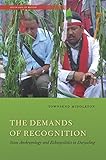The demands of recognition : state anthropology and ethnopolitics in Darjeeling / Townsend Middleton.
Material type: TextSeries: South Asia in motionPublisher: Stanford, California : Stanford University Press, [2016]Copyright date: ©2016Description: 1 online resourceContent type:
TextSeries: South Asia in motionPublisher: Stanford, California : Stanford University Press, [2016]Copyright date: ©2016Description: 1 online resourceContent type: - text
- computer
- online resource
- 9780804796309
- 0804796300
- Ethnology -- Political aspects -- India -- Darjeeling (District)
- Ethnicity -- Political aspects -- India -- Darjeeling (District)
- Identity politics -- India -- Darjeeling (District)
- Darjeeling (India : District) -- Scheduled tribes -- Government policy
- SOCIAL SCIENCE -- Anthropology -- General
- SOCIAL SCIENCE -- Regional Studies
- SOCIAL SCIENCE -- Sociology -- General
- Ethnicity -- Political aspects
- Ethnology -- Political aspects
- Identity politics
- India -- Darjeeling (District)
- 301.0954/14 23
- DS432.G87
- LB 36385
| Item type | Home library | Collection | Call number | Materials specified | Status | Date due | Barcode | |
|---|---|---|---|---|---|---|---|---|
 Electronic-Books
Electronic-Books
|
OPJGU Sonepat- Campus | E-Books EBSCO | Available |
Online resource; title from PDF title page (EBSCO, viewed September 2, 2015).
Includes bibliographical references and index.
Introduction : becoming tribal in Darjeeling : an introduction to the ethno-contemporary -- A searching politics : anxiety, belonging, recognition -- Durga and the rock : a colonial category and its discontents -- Tribal recognition : a postcolonial problem -- Interface : encounters of the multicultural state -- Soft science in hard places : government anthropologists and their knowledge -- Reforming the subject : the effects and affects of recognition -- Perpetuated paradigms : at the limits of ethno-intelligibility -- Epilogue : negotiating the ethno-contemporary.
Since the British colonial period anthropology has been central to policy in India. But today, while the Indian state continues to use ethnography to govern, those who were the "objects" of study are harnessing disciplinary knowledge to redefine their communities, achieve greater prosperity, and secure political rights. In this groundbreaking study, Townsend Middleton tracks these newfound "lives" of anthropology. Offering simultaneous ethnographies of the people of Darjeeling's quest for "tribal" status and the government anthropologists handling their claims, Middleton exposes how minorities are--and are not--recognized for affirmative action and autonomy. We encounter communities putting on elaborate spectacles of sacrifice, exorcism, bows and arrows, and blood drinking to prove their "primitiveness" and "backwardness." Conversely, we see government anthropologists struggle for the ethnographic truth as communities increasingly turn academic paradigms back upon the state. The Demands of Recognition offers a compelling look at the escalating politics of tribal recognition in India. At once ethnographic and historical, it chronicles how multicultural governance has motivated the people of Darjeeling to ethnologically redefine themselves--from Gorkha to tribal and back. But as these communities now know, not all forms of difference are legible in the eyes of the state. The Gorkhas' search for recognition has only amplified these communities' anxieties about who they are--and who they must be--if they are to attain the rights, autonomy, and belonging they desire.
eBooks on EBSCOhost EBSCO eBook Subscription Academic Collection - Worldwide
There are no comments on this title.

